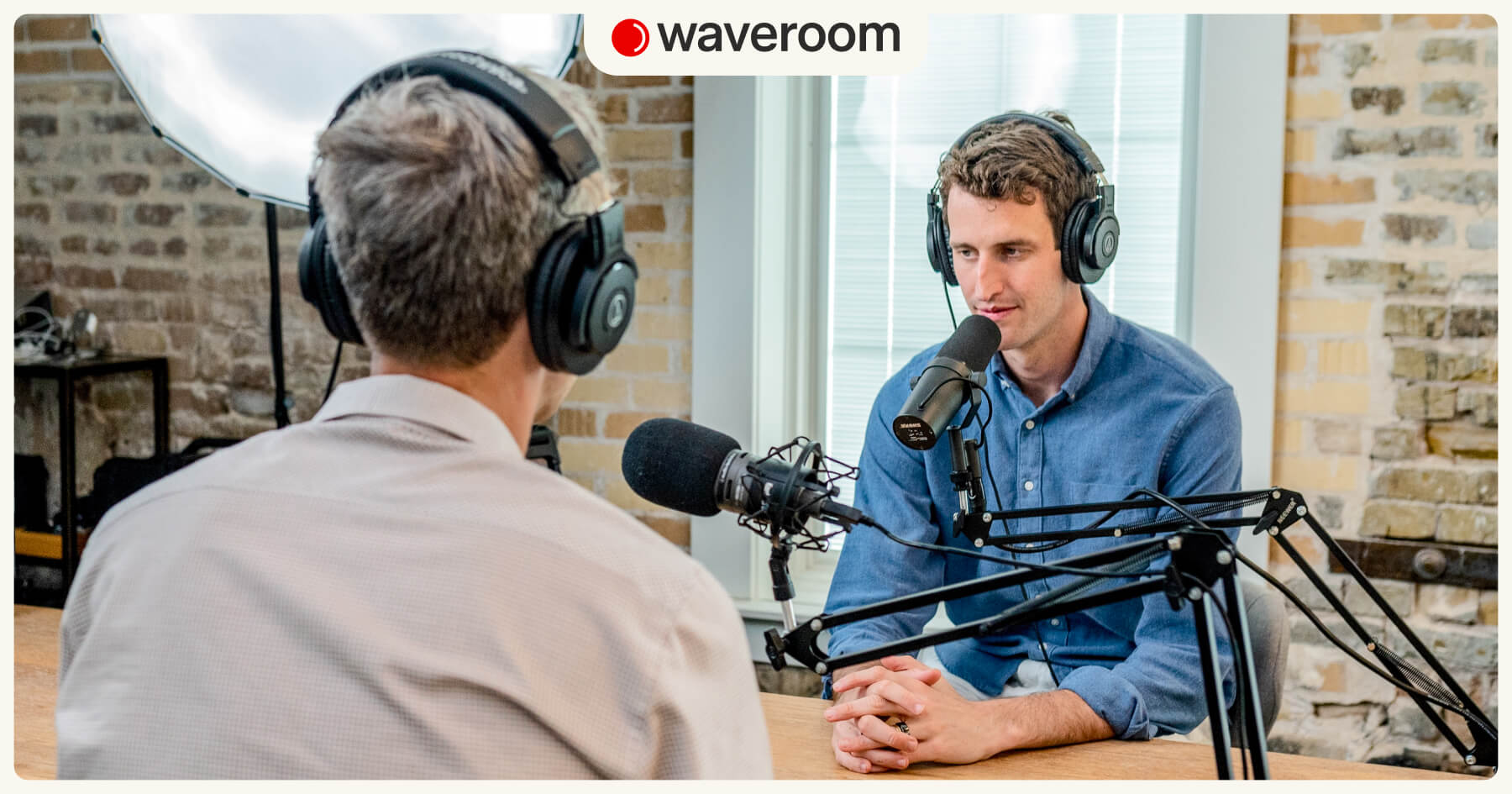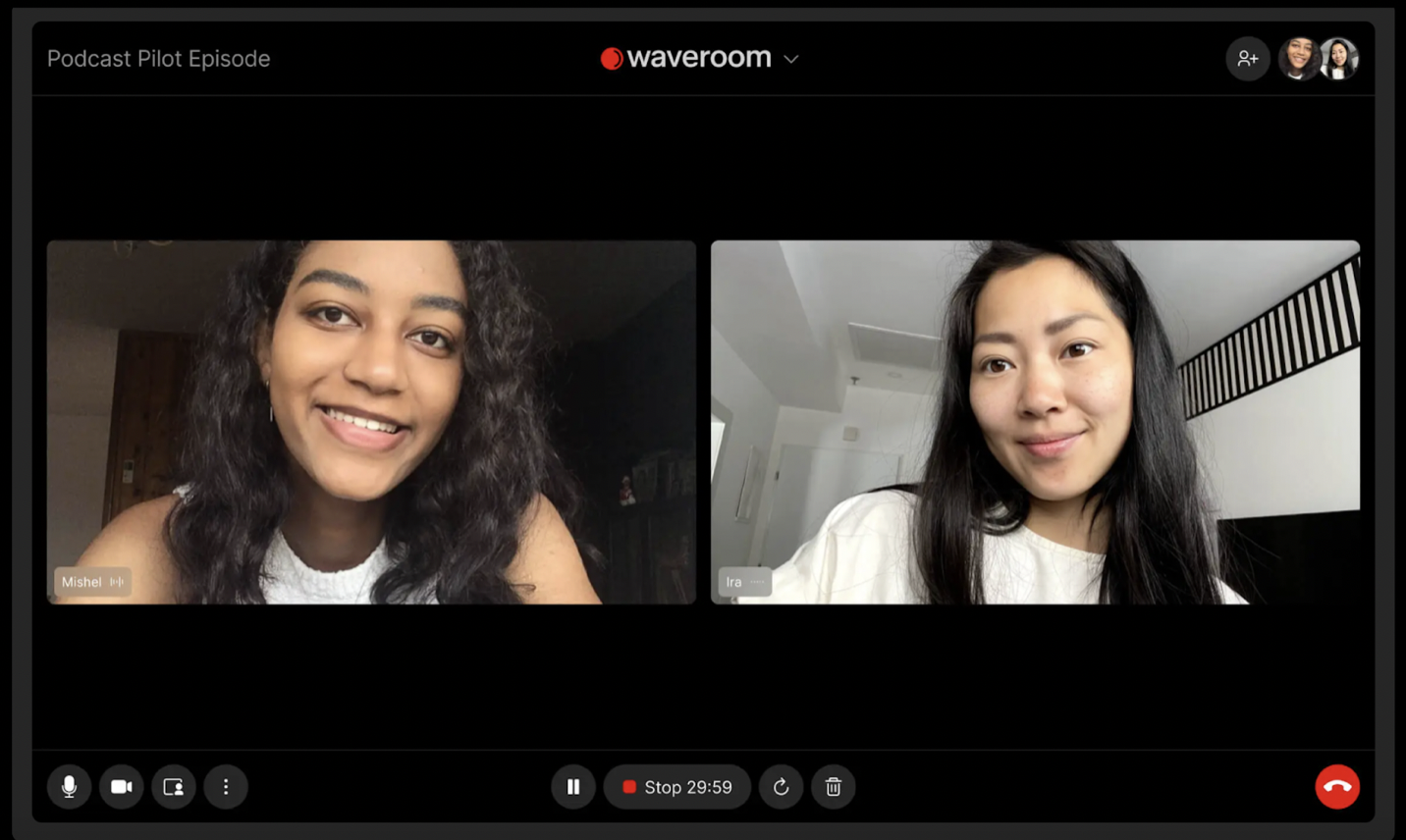How to Find a Podcast Co-Host
Tips, tactics, and tools to find and pick a co-host for your show.

In one of our previous posts, we’ve covered various podcast formats, such as solo shows, interviews, discussion panels, and others. And if with solo podcasts and interviews it’s pretty much clear, co-hosted discussions might bring these questions to the table: Who to have a co-hosted show with? How to find a co-host? How to pick them?
This is what we’ll touch on in this piece. But first, let’s talk about whether you need a co-host for your show at all.
A podcast with a co-host: Pros & cons
A co-host brings a different perspective, voice, and personality to the podcast. This diversity of viewpoints means richer discussions, more varied content, and a wider appeal to different types of listeners.
What’s more, a back-and-forth conversation between co-hosts can create a more engaging and dynamic atmosphere, which makes the podcast feel more natural and makes listeners feel as though they're part of the conversation.
Some other benefits of having someone else on your show as a co-host are:
- Researching topics, scripting, recording, editing, and promoting episodes can be too much for one person's plate. Sharing these responsibilities with a co-host can help lighten the workload, making it more manageable for both hosts. Both of you are responsible for maintaining the podcast's schedule, preparing for episodes, and delivering consistent content. And collaborative brainstorming can generate new ideas and directions for the show.
- If the podcast covers a diverse range of topics, having co-hosts with complementary expertise can enhance the quality of the discussions. Each co-host can contribute their specialised knowledge to create more well-rounded content.
- Co-hosts can bring their own followers and fans to the podcast, expanding its reach and potential audience. This cross-promotion can help increase the show's visibility and attract new listeners.
- If your show relies on conflict, having co-hosts with differing opinions implies lively debates and discussions that captivate listeners and encourage critical thinking.
The advantages are quite clear, but don't rush to invite your friend to co-host a show with you. Yet.
Now, let's cover the flaws.
- Your potential co-host and you may have different ideas about the podcast's direction, format, or content. Conflicting creative visions often lead to disagreements and challenges in maintaining a cohesive and consistent show. Over time, creative differences might become more pronounced, bringing tensions that affect the podcast's content and overall atmosphere.
- Coordinating schedules can be challenging, especially if co-hosts have different commitments, time zones, or availability. This will result in delays in recording episodes and consistent content delivery.
- If one co-host ends up doing significantly more work than the other, it may end up with feelings of resentment and imbalance in the partnership. Ensuring a fair distribution of responsibilities is crucial for maintaining a healthy working relationship.
- If your co-host decides to leave or loses interest, beware that it may disrupt the continuity of the show and take away some part of your listeners.
- If your podcast generates revenue, dividing income and making financial decisions can become complex and potentially result in disputes if not discussed and agreed upon in advance.
- Ensuring consistent quality and content can be challenging when there are multiple hosts responsible for creating episodes. Maintaining a consistent tone, style, and branding can require additional effort and coordination.
How to find a podcast co-host
Before seeking a co-host, have a clear understanding of your podcast's niche, format, and goals, as this will help you identify the type of co-host who would best complement your vision. Then, make a list of qualities you're looking for in a co-host. Factors such as expertise, communication skills, personality, availability, and commitment level are your starting points.
Now let's see which steps and tactics you can use to find a co-host for your show:
🔴 Use your existing network
Reach out to your personal and professional networks. Ask friends, colleagues, and acquaintances if they know anyone who might be interested in co-hosting a podcast. Or ask them to be your co-host if you feel they might be a good fit!
Look for individuals who have experience in related fields, such as radio, broadcasting, public speaking, or content creation. Their skills can be valuable assets to your podcast.
When you've identified potential co-hosts, talk to them to gauge your compatibility. Share your podcast's vision, format, goals, your expectations, commitment levels, and how you can complement each other's strengths.
Have you ever invited a guest to your show? If so, consider if they might be a good fit as a co-host.
🔴 Leverage the power of related events
Attend networking events, conferences, workshops, and meetups related to podcasting or your podcast's niche might be a perfect opportunity to hunt a podcast co-host. Such events let you connect with potential co-hosts who share your interests, and engaging with individuals who share your interests may be a potential to find co-host candidates.
Pay attention to not only how well your potential co-host fits with you but also how well they might connect with your target audience, since compatibility with both you and your potential listeners is essential.
🔴 Use specialised tools
Choose online platforms specifically designed for finding co-hosts or collaborators. Websites like Find A Co-Host, Podcast Guests, and MatchMaker.fm can help you connect with potential co-hosts.
If you're looking to partner with someone who already has a following or expertise in your podcast's niche, reach out to influencers, bloggers, or content creators who align with your podcast's vision. Explain your idea and how collaboration could be beneficial for both of you. Identify influencers who are experts in your podcast's topic and reach out to them with a proposal for co-hosting, leveraging their expertise to enhance your podcast's credibility.
🔴 Leverage the power of online communities
Participate in podcasting forums, Facebook groups, and subreddits related to podcasting as engaging in these communities can help you connect with potential co-hosts who are passionate about podcasting and your podcast's topic.
Use platforms like LinkedIn, Twitter, Facebook, and Discord to connect with individuals, share your search for a co-host, and ask for recommendations.
🔴 Give your guest a test
Before making a final decision, record a few trial episodes with potential co-hosts. This can help you evaluate how well you work together on-air and whether your chemistry translates to engaging content.
Before you start recording, clearly outline roles, responsibilities, and expectations in a written agreement. Such vital facets as episode planning, recording schedules, content creation, and division of tasks should also be addressed in advance.
🔴 Trust your instincts
Trust your gut feeling about whether a potential co-host is a right fit. It's important to have a comfortable working relationship and a shared passion for the podcast's topic.
Now that you've found a few perfect podcast host candidates, it's time to pick the one and only. Here are the things to pay attention to when making a final decision.
How to pick a podcast co-host
You can use these tips as a checklist.
- Ensure that your potential co-host has a genuine interest, expertise, or knowledge of the podcast's subject matter. Their background should align with the content you plan to create.
- Look for a co-host whose personality complements yours and creates a positive dynamic. The chemistry between co-hosts can significantly enhance the podcast's appeal.
- Choose someone who shares your passion for the podcast's topic. Enthusiastic co-hosts are more likely to engage listeners and create compelling content.
- Look for someone with a strong work ethic who is willing to contribute their fair share to tasks like research, recording, editing, and promotion.
- Consider their ability to bring fresh ideas and creativity to the podcast. A co-host who contributes creatively can help keep the content engaging and innovative.
- Choose a co-host who can handle conflicts and disagreements in a constructive way. Effective conflict resolution is important for maintaining a healthy partnership.
- Evaluate how well the potential co-host can engage with the audience.
- Assess their technical skills, such as familiarity with recording equipment, editing software, and other tools essential for podcast production.
9. Ideally, your co-host should have some experience in broadcasting, public speaking, or hosting, which can bring a professional touch to your podcast's delivery.
10. Check if your potential co-host has a personal network or existing audience that could help promote the podcast and attract listeners.
Before making a final decision, spend some time getting to know your potential co-host through informal conversations or trial recordings. This will help you realise how well you can work together and whether your co-host has the qualities that will contribute positively to your podcast's growth and success.
Take the time to thoroughly assess potential co-hosts using these criteria to ensure a successful and harmonious podcasting experience.
Podcasts with co-hosts: Examples
Looking for inspiration or just want to see how co-hosts build this chemistry together that we mentioned above a few times? Here are a few examples of popular co-hosted podcasts across different genres:
- The Joe Rogan Experience: Hosted by Joe Rogan and various co-hosts, this podcast features long-form conversations with a wide range of guests, including comedians, scientists, authors, and celebrities.
- My Favorite Murder: Hosted by Karen Kilgariff and Georgia Hardstark, this true crime comedy podcast features the two hosts discussing their favourite murder cases and engaging with listeners' stories.
- Armchair Expert with Dax Shepard: Hosted by Dax Shepard and Monica Padman, this podcast explores various topics through conversations with experts and celebrity guests, often delving into personal experiences and life lessons.
- Stuff You Should Know: Hosted by Josh Clark and Charles W. "Chuck" Bryant, this educational podcast explores a wide range of topics, explaining how things work, historical events, and fascinating facts.
How to record a podcast with a remote co-host with Waveroom
Waveroom lets you record a podcast with up to four co-hosts. Here's how:
- Log in to your Waveroom account.
- Click the Create Room button.
- Enter the name of the room to easily navigate between the existing rooms in your personal dashboard.
- Set your Video, Audio and Record preferences under the video preview.
- To invite a co-host to the podcast, copy the invite link and send it to people you want to join your show.
- Click the Start Now button to launch your session.
- Click the Record button when you’re ready to record the show and click Stop when the recording is no longer needed.
- Click the cross icon to end the recording.
- Wait a few seconds while the recording is saved.
- Click the All Rooms button at the upper left corner of the page.
- Click the room that you’ve been in. Here, you can play and download the locally recorded video and audio files of each person who participated in the meeting.

As Waveroom has the tracks of each participant separately recorded, it'll be easier for you to edit your or your guest's track during the post-production. It's a lot simpler to edit the interview if it's recorded with Waveroom!
Want to add something & never miss posts like this? Follow us on Twitter, Instagram, Facebook, and Reddit.